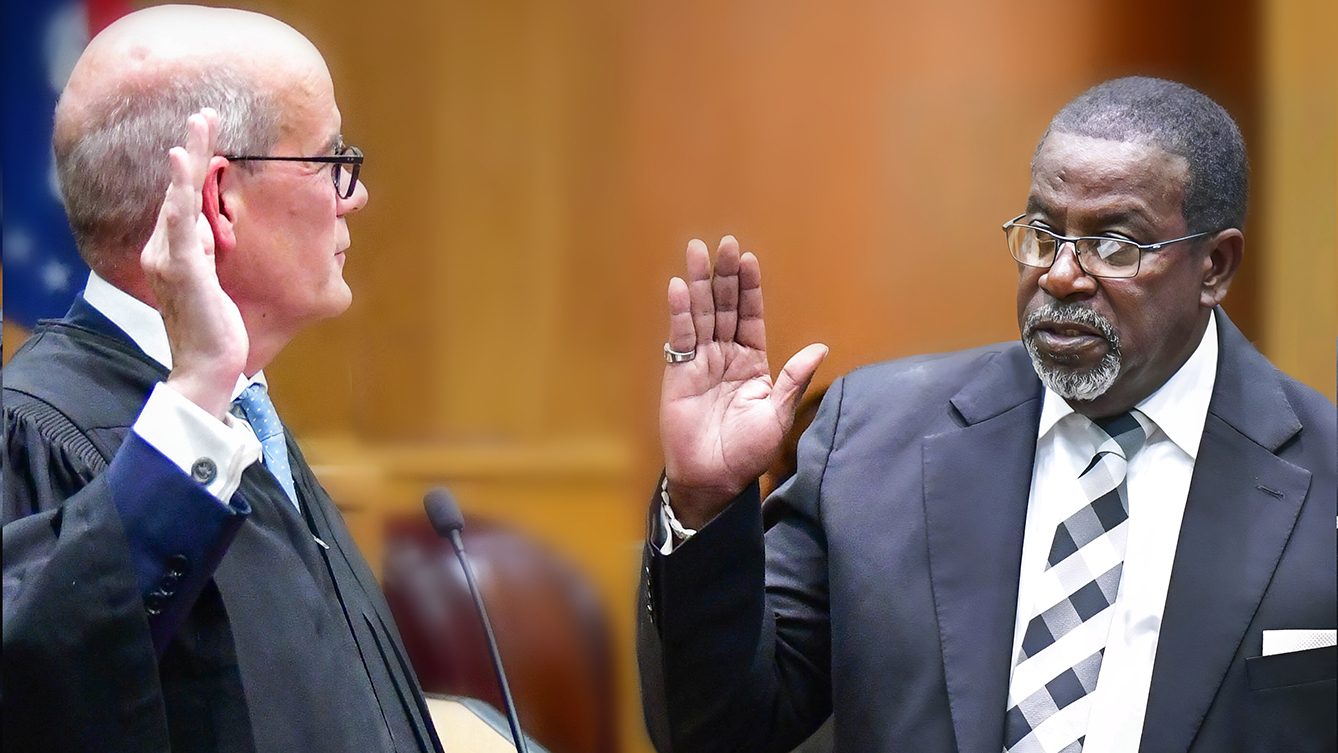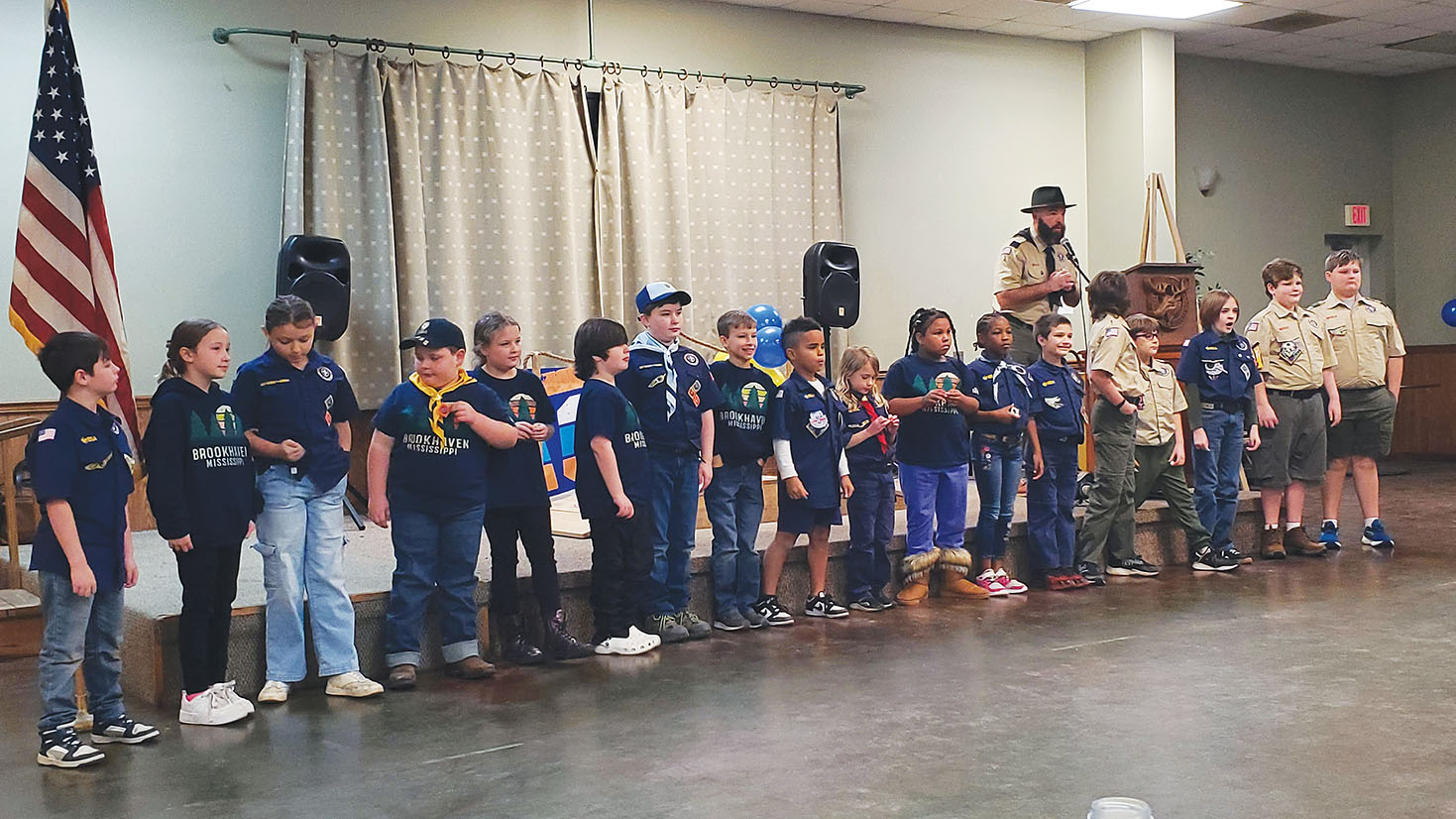‘Really scared’ resident speaks to Aldermen on free speech, fluoride, and filming the police
Published 1:00 pm Thursday, February 20, 2025

- PHOTO BY BRETT CAMPBELL Brookhaven resident William Reed addresses the Board of Aldermen Tuesday. Chief of Police Kenneth Collins stands near the doorway.
Brookhaven resident William Reed appeared before the Board of Aldermen and Mayor Joe Cox this week to voice concerns about city water and policing.
Reed had attended the previous meeting two weeks prior and was frustrated to find out that he had to be on the agenda in order to speak during the meeting. He was informed of the City’s rule that “all items for the agenda are to be in the City Clerk’s Office by 12:00 o’clock, noon, on Thursday prior to the board meeting” and that speakers “will be limited to 5 minutes and limited to the topic” they requested to speak on. He began his time at the podium this week by addressing this requirement as “absolutely ridiculous.”
“The whole thing about having to sign away my life to come to a town hall meeting to speak my mind, which is my First Amendment right, granted to me by birth, is absolutely ridiculous. I shouldn’t have to fill out — everybody has my address. I’m a private citizen, OK? You all are public officials. I’m private. I don’t have to give out my name and address … my address is on that piece of paper,” said Reed, referring to the printed agendas available to any person attending the meetings.
“Hey, anybody who doesn’t like what I have to say right now, feel free to come on by, egg my house, do a drive-by, you know,” Reed said, turning to look across the room.
He appeared surprised to see Police Chief Kenneth Collins standing near the doorway of the boardroom and said, “Hey, what’s up, Chief?” — before turning back to the board and adding, “I’m really scared, actually, right now.”
“Uh, so, that needs to go, OK? That — what is this? Communist China? Nazi Germany? You know, do I have to give my fingerprints, too, next, my DNA, a retina scan, just to talk at a public meeting? This is a public meeting. Anybody should be able to come in here and say, ‘Hey, I need to talk.’ What if I was in from out-of-town? What if I was illiterate? What if I didn’t know how to read or write? Do you know how embarrassing that is? Now I have to go up to somebody and say, ‘Hey, can you help me fill out this’ — I don’t know how much time I’m taking …” Reed said, periodically looking around toward Collins.
When Reed asked how much time he had left to speak, the mayor told him he had approximately three and one-half minutes.
“Next, we need to get the fluoride out of our water. Absolutely ridiculous. Aside from any kind of uh, you know, uh, conspiracy theories or anything like that, I pay this City, this town, for drinking water. OK? Now, you all treat this water with fluoride. You’re not treating the water with fluoride — you’re treating us. We, the people,” said Reed. “I did not sign up to be medicated without my consent. I have fluoride in my toothpaste. Did you all know that you can inhale fluoride? So, every time y’all are taking a shower in the morning, you know, a nice hot shower, you’re inhaling fluoride, you know. That’s not great. That’s not awesome. OK? There’s too much fluoride and that causes actual fluoridosis [sic], OK? It poisons. It’s not good. We need to also look at it. We don’t want fluoride in our water. It’s time for a change.”
Reed was referring to fluorosis, a condition that affects the teeth, causing white or brown spots or streaks on the enamel. It occurs from too much fluoride being consumed during the development of the teeth enamel, and is primarily a concern for children under the age of 8.
“Next part, I’m really scared, because …,” Reed said, fidgeting nervously and pointing toward Chief Collins. “Huh, Chief of Police standing right behind me is really scary.”
Collins said, “Let me step over here,” then moved from where he had been near the doorway and took a seat in the gallery.
“You know what, no, no, if you always, you want to put me in cuffs right now for talking, just like the last time I was here, at the last — OK.”
When Reed was informed at the previous meeting that he could not speak unless he was on the agenda, he spoke with Collins outside the boardroom for several minutes about being detained while videotaping the police. The chief said, “William, you can’t interfere with an investigation.”
Reed was not threatened with arrest or being handcuffed during the meeting or that interaction.
“I’m really scared right now,” the Ole Brook Road resident continued to address the board, saying on Dec. 22, 2024, he was videotaping a shooting that happened in his neighborhood. Reed recorded portions of the aldermen meeting with a Go-Pro camera mounted on a tripod, including his time at the podium.
“It was my personal right. Freedom of press. You don’t have to have press credentials to be ‘press.’ Who grants that? God. OK, come on, now. We’re free. Land of free. Home of the brave. Not land of tyranny and home of the enslaved. OK? I’m free. I’m free to put a camera right in that man’s face,” he said, pointing to Collins. “Especially when he has on that badge right there, that we the people have entrusted him with and people like him. Because he has the power of God. He can literally decide my fate, my life, my destiny, with a snap of his fingers. Ain’t nothing I can do about it. I would rather face a criminal a thousand times over than have to defend myself from a police officer. That’s why I’m so scared right now standing right here.”
“Because here is a scar,” he said, touching his left wrist, “from where I got put in cuffs for videotaping the police. I stood behind their yellow line. I did nothing. Interference is a physical thing. I cannot interfere by talking. Mere speech is not interference. I have to physically put my hands on you or do something physically to interfere. I got handcuffs put on me. The reason for me having handcuffs put on me is because I was video filming the police truck that was behind the yellow line. I was not past the yellow line. This is all on video. Every piece, every minute of that inter- when I showed up. It’s all on video. And I would like to have all of the video evidence and all, everybody’s bodycam footage because [then-BPD detective] Vincent Fernando was one of the ones that put handcuffs on me.”
At that point, the five-minute limit alarm had been sounding for approximately 40 seconds, and Mayor Cox spoke up.
“OK, we’re done. We’re done, timewise. We gave you a few more seconds there. Appreciate you coming,” Cox said, and Reed exited the boardroom.
When Collins spoke to the Board a few minutes later during his report time, Reed returned to the boardroom and stood with his camera near the doorway behind the chief, where Collins had stood earlier.
The chief said no one can be hindered from filming police, but when they are too close to sensitive police equipment and will not step back when asked to do so, that is when an issue occurs.
Fernando was actually the officer who removed the cuffs from Reed and told him he could go home, Collins said.
According to the Mississippi Ethics Commission, “Any public body may make and enforce reasonable rules and regulations for the conduct of persons attending its meetings” [§ 25-41-9]. The Mississippi Open Meetings Act does not give members of the public the right to be heard at a public meeting.
Fluoridation of water occurs in approximately 75 percent of the U.S. water supply. The Centers for Disease Control and Prevention, American Medical Association, American Academy of Pediatrics, and American Dental Association all recommend community fluoridation programs. Beginning in 1962, the U.S. Public Health Service recommended public water supplies contain 0.7 to 1.2 mg/Liter of fluoride to help prevent tooth decay. In 2015, the recommendation was set a 0.7 mg/L. Some amounts of the chemical occur naturally in water, soil, and certain foods.
Mississippi law permits recording of any activity that occurs in public, including actions by law enforcement. The person recording is advised by the American Civil Liberties Union (ACLU) to “stand at a safe distance” and do not interfere with the police or cause others to resist arrest.





